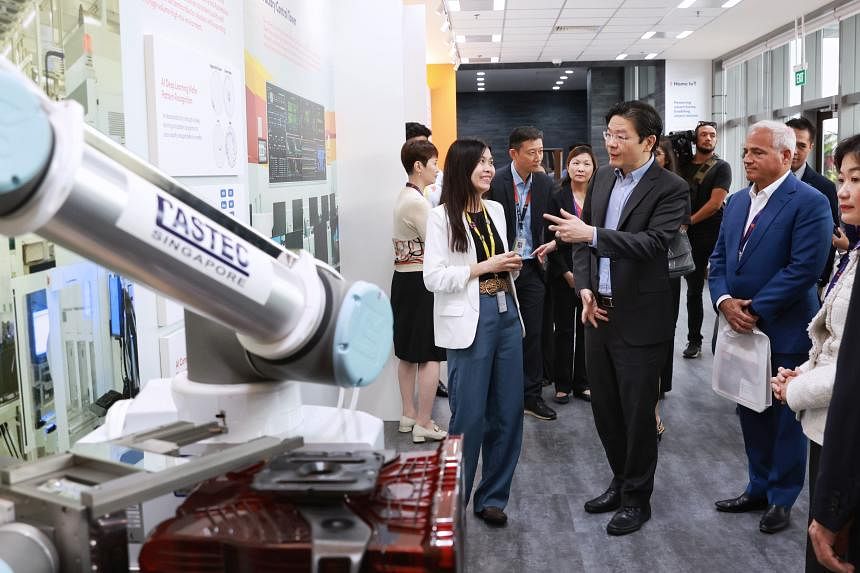SINGAPORE – The decision by GlobalFoundries (GF) to expand its manufacturing base here proves that Singapore will continue to have a strong, competitive and vibrant semiconductor industry despite the intense global battle for high-end chip investments, Deputy Prime Minister Lawrence Wong said on Tuesday.
Speaking at the opening ceremony of the US-based company’s new US$4 billion (S$5.5 billion) microchip fabrication plant in Woodlands, Mr Wong said Singapore “cannot afford to engage in a subsidy arms race” and outbid the United States, China, Japan and European Union, which have rolled out massive subsidies to attract chipmakers.
While Singapore is not the cheapest location worldwide, he noted that “we have many things going for us – our excellent connectivity; our reliability and stable business conditions; and also a critical mass of leading companies based here which cover the value chain, from design to wafer fabrication, to assembly and testing”.
He added that Singapore’s key asset is human capital – a well-educated and highly skilled workforce that powers its strong innovation and research capabilities.
“All these factors have allowed us to build an ecosystem that enables companies to achieve sustained growth, and to create good jobs for our people,” said Mr Wong, who is also Finance Minister.
In addition to the workforce advantage, he said that over the years, Singapore has carved out a niche in the production of speciality chips, which are present in almost every device used daily and will continue to be in strong demand given the trends in 5G, automotives and the Internet of Things.
“We will continue to sharpen our capabilities and enhance our competitiveness in these specific areas of strength, and GF’s latest investment shows that our strategies are working,” he said.
Mr Wong said the company’s expanded plant will be the first wafer fab in Singapore capable of manufacturing speciality chips at 28 nanometres (a nanometre is one-billionth of a metre). These chips support a wide range of applications including in both consumer and industrial products.
“In other words, there is a high chance that the image sensors and radio frequency chips inside smartphones and electric vehicles of the future will be made from GF’s Singapore fab,” he said.
Mr Wong said the expansion of GF’s plant will create up to 1,000 high-value jobs, the majority of which will be filled by Singaporeans, who will benefit from picking up the manufacturing and research and development (R&D) know-how from the advanced technologies used. GF is already an active partner in Singapore’s efforts to nurture students’ interest and skills in science, technology, engineering and mathematics to build a strong talent pipeline.
He said up to 32 GF employees have been given the opportunity to conduct industry-relevant PhD research since the Industrial Scholarship Programme with Nanyang Technological University (NTU) started about six years ago.
“GF has also invested heavily in R&D and has been a steadfast partner of our research institutions, with ongoing projects with NTU and the National Research Foundation. In fact, I understand that with more than 700 R&D professionals, GF has one of the largest corporate R&D teams in Singapore,” said Mr Wong.
The world’s third-largest contract chipmaker has one of the largest wafer foundries in Singapore and employs more than 4,900 people.
The expanded fab will produce an additional 450,000 wafers of 300mm each annually, raising GF Singapore’s overall capacity to about 1.5 million wafers a year.
Dr Thomas Caulfield, president and chief executive of the company, said the new site will be instrumental in ensuring GF has the capacity its customers need as they seek to strengthen their supply chains.
“This new facility is the result of our close partnership with our customers and the Singapore Government, and testament to the hard work and effort put in by our employees,” he said.
Since GF started its operations in Singapore in 2009 by acquiring home-grown Chartered Semiconductor, the company has invested about US$23 billion here.
Speaking to the media on the sidelines of Tuesday’s event, Mr Tan Yew Kong, senior vice-president and general manager of GF Singapore, said that with the current weak global demand for semiconductors, the new site will reach full capacity by late 2025 or early 2026.
However, demand conditions will start to improve later in 2023 when global inventories of semiconductors are likely to be depleted to a level where new orders will start to grow in earnest.
At full capacity, GF Singapore will contribute about 45 per cent of the group’s global revenue, up from about 33 per cent now, he added.


